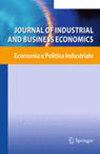Digitalization and informal economy: a global evidence of internet usage
IF 2.5
Q2 ECONOMICS
引用次数: 0
Abstract
This article investigates the links between the technological evolution and the importance of informal economic activities. We examine the influences of internet usage on the shadow economy in a global sample between 2002 and 2015. With this purpose, we mobilize the panel fixed-effects estimate and the panel corrected standard errors estimate (as a robustness check) for the analysis of 114 economies (and three sub-samples including high-income economies (HIEs), upper-middle-income economies (UMEs), and lower-middle-income economies (LMEs)). Our results indicate that the use of the internet generally has a negative impact on the shadow economy. This influence of internet is consistent across all institutional environments. Interestingly, technology is not spread through the shadow economy in the same way everywhere since we observe a U-shaped relationship between internet usage and the shadow economy. Our research shows that technology might also have a negative influence on official activities if its implementation is not combined with an appropriate institutional policy allowing policy-makers to avoid the technology-side effects.数字化与非正规经济:互联网使用的全球证据
本文探讨了技术演进与非正式经济活动重要性之间的联系。我们在2002年至2015年的全球样本中研究了互联网使用对影子经济的影响。为此,我们对114个经济体(以及包括高收入经济体(HIEs)、中高收入经济体(me)和中低收入经济体(LMEs)在内的三个子样本)的分析运用了面板固定效应估计和面板修正标准误差估计(作为稳健性检查)。我们的研究结果表明,互联网的使用通常对影子经济产生负面影响。互联网的这种影响在所有制度环境中都是一致的。有趣的是,由于我们观察到互联网使用和影子经济之间呈u型关系,技术并没有以同样的方式在影子经济中传播。我们的研究表明,如果技术的实施没有与适当的制度政策相结合,使政策制定者能够避免技术副作用,那么技术也可能对官方活动产生负面影响。
本文章由计算机程序翻译,如有差异,请以英文原文为准。
求助全文
约1分钟内获得全文
求助全文
来源期刊

Journal of Industrial and Business Economics
Economics, Econometrics and Finance-Economics, Econometrics and Finance (all)
CiteScore
8.00
自引率
0.00%
发文量
31
期刊介绍:
This peer-reviewed journal, established in 1973, uses the lenses of industrial and business economics to investigate issues relevant to scholars, managers and policy makers.
The key areas of interest of JIBE are: industrial organization and policy; international business and international economics; innovation and entrepreneurship; corporate governance and finance.
Within these key areas, JIBE pays special attention to topics relating to grand challenges in a transforming world. A non exhaustive list of current issues includes: emergent technologies and industry dynamics; the digitalization of industries and financial markets; evolving multinationals and global value chains; environmental change and green transition; sustainable development of emerging economies; competition, regulation and structural policies in the platform economy.
JIBE welcomes papers that combine advancements in the theoretical understanding of phenomena with rigorous, systematic and original evidence-based empirical analysis, using quantitative or qualitative approaches as well as experimental and mixed methods. The journal is open to industry-, firm- and individual-level analyses, while the geographic scope may vary from subnational regions to nations and supra-national contexts, with a particular consideration of the EU and other integration processes.
The journal also publishes special issues and symposia aimed at opening debate among scholars on specific topics and discovery-type papers on emerging issues in industrial and business economics.
The journal is owned by the Associazione Amici di Economia e Politica Industriale.
 求助内容:
求助内容: 应助结果提醒方式:
应助结果提醒方式:


